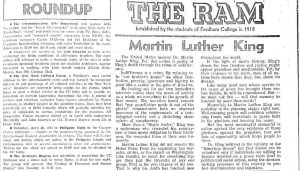By Ryan Di Corpo
Today marks the 50th anniversary of the assassination of the Rev. Dr. Martin Luther King, Jr. at the Lorraine Motel in Memphis, Tennessee.
Dr. King’s violent death added a match to the raging cultural inferno of anti-war activism and civil unrest that defined 1968 in America. In the aftermath of the killing, riots broke out in major cities across the United States, including Baltimore, Chicago, and Washington, D.C.
Others marched peacefully, mirroring Dr. King’s fervent commitment to nonviolent action. In memory of Dr. King and his message of racial unity and Christian pacifism, The Fordham Ram looks back at on-campus reaction to his death.
According to the April 11, 1968 issue of The Fordham Ram, Rev. Leo P. McLaughlin, S.J., then president of the University, concelebrated a Mass with 13 other priests in honor of Dr. King. In his homily, the Rev. Robert McNamara (not that Robert McNamara) remarked upon Dr. King’s “essential Christianity” which led him to a message of love and acceptance.
University chaplain Rev. Edward F. Clark referred to the reaction to Dr. King’s death as the most significant “since the death of Kennedy.”
Furthermore, Fr. McLaughlin released a statement to the University addressing the assassination.
The statement reads, in part: “[Dr. King] revealed himself as the brother of all men and, as a result, his loss diminishes each one of us. Each one of us is less today than we were yesterday, but we can all serve his memory best by living together and striving to achieve the dream he had of America.”
Student reaction commented on hope for the persistence of nonviolence in the face of injustice. Robert Bennett, a student member of Fordham’s Society for Afro-American Advancement, stated that the success or failure of nonviolence was linked to “white America’s response to Dr. King’s death.” Student Sharyn Russell, also of the Society, felt that the death of Dr. King could function to “strengthen the nonviolent movement if people pay attention to […] his life.”
In a statement by The Fordham Ram in the same issue, the paper accused the United States as guilty of “the crime of indifference” for allowing “poverty, ignorance and bigotry to grow like a cancer in the guts of America.” The statement continues that Dr. King “stood for something bigger than just the interests of any one group,” contributing the immense loss which his death represents. The Fordham Ram also takes a critical stance towards the construction of monuments to Dr. King instead of individuals involving themselves “on a grass roots level in politics and social action.”
Five decades after his death, Dr. King’s place in American history is secure. Just ask the massive memorial built in his honor in Washington, D.C. In celebration of his life, activists and political leaders such as Suzan Johnson Cook and Adam Clayton Powell IV will gather tonight at the Riverside Church to keep alive Dr. King’s ever-relevant mission of justice.






































































































































































































